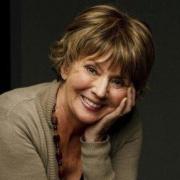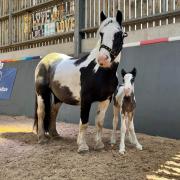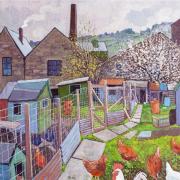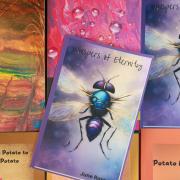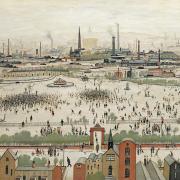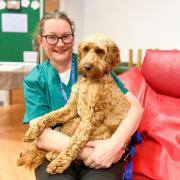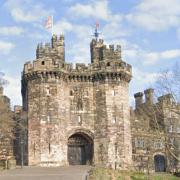Events this year will honour Charlotte Mason, a pioneering teacher who founded a school in Ambleside that was ahead of its time
For her influence on the modern world, Charlotte Mason must be up there with William Wordsworth, John Ruskin, Canon Hardwicke Rawnsley, Beatrix Potter and others who varnished their innovative ideas in the Lake District.
She mixed with many of the leading thinkers of the late Victorian age and put her ideas into practice around the turn of the century.
Born in 1842, Charlotte Mason was an experienced schoolteacher who passionately believed in the importance of education for all members of society, regardless of gender or social class. Her philosophy was that children should be valued as people and should be educated through real situations.
She was a pioneer of many ideas which are still relevant today: educating women, learning in and from the outdoors, allowing children to be themselves and involving parents in their children’s education. Indeed, there are millions of families throughout the world who still adhere strictly to her methods for learning at home.
And this year there is a programme of events planned to commemorate the 100th anniversary of the death of the woman who has inspired generations of parents, teachers and children around the globe.
It kicked off in January, the month she died in 1923, with a centenary retreat for the UK Charlotte Mason community, hosted at the University of Cumbria Ambleside campus. The site of the campus is where Charlotte Mason set up her original House of Education, which later became Charlotte Mason College.
This month sees an exhibition called Learning through the Natural World which opens at The Armitt Library and Museum in Ambleside on February 22 and runs to the end of the year.
Miss Mason was an early champion of outdoor learning – not just geography and biology, but also art, literature and wider sciences – and encouraged pupils to keep nature diaries. The Armitt has been bequeathed many examples, full of descriptive writing and detailed colour drawings of flowers.
Armitt manager and curator, Faye Morrissey, said: ‘Particularly since the pandemic, people seem to need to feel good about being outdoors. Beliefs about health and well-being and Charlotte Mason’s philosophies about being outdoors in nature have real relevance today.’
The Armitt has a treasure trove of artefacts given by the last principal of Charlotte Mason College when it closed in the mid-1990s. They received more than 60 boxes of test papers, notebooks, correspondence, diaries and magazine articles written by Miss Mason.
There are shelves of bound volumes of the Parents Review, the magazine set up by Miss Mason around the time she set up the Parents National Education Union when she lived in Bradford, West Yorkshire in the 1880s. They have books written about Charlotte Mason and even two of her original dresses, which are due to be displayed. A replica is also being made of one for visitors to try on.
The Armitt link goes even deeper as Miss Mason was also a friend of the museum’s founder, Mary Louisa Armitt, one of three sisters from Salford who ended their days at Rydal in the Lakes mixing with and befriending the influential thinkers of the day. Beatrix Potter was an early member of the Armitt.
Miss Mason was born in Bangor, North Wales, 1842, an only child whose parents died when she was a teenager. But she had already shown an interest in education and won a scholarship to the Home and Colonial College in London. She finished her teacher training early due to poor health, but still managed to become headmistress of an infants’ school in Worthing.
She then became a senior governess at a school in Chichester, before illness again intervened and she moved to a friend’s house in Bradford. It was there she developed her revolutionary ideas, producing the Parents Review magazine, which featured all the hot education topics of the day, and setting up the Parents National Education Union (PNEU).
Some parents educated their own children at home, some were asked to take other people’s children and some even set up their own schools. There was an early PNEU school in Morecambe and they spread all over the world.
She frequently visited the Lake District and became passionate about the area, settling in Ambleside in 1891 and setting up her House of Education in Ambleside the following year, with just four students. Within months, numbers began to grow.
After she died in 1923, her house of education became known as Charlotte Mason College, training predominantly women to become teachers. It was only later in the 20th century it accepted men, before closing in 1997, when it became part of Lancaster University. St Martin’s College took over the management of the college in the late 1990s.
When the University of Cumbria was set up in 2007, bringing together Cumbria Institute of the Arts, St Martin's College and the Cumbrian campuses of the University of Central Lancashire, its campus in Ambleside was developed on the old Charlotte Mason site.
Many of the university’s courses, including forestry and outdoor education, have Charlotte Mason’s philosophies at its core.
The university is partnering the Armitt in the celebrations, and campus director, Professor Lois Mansfield, said: ‘Charlotte Mason was a truly remarkable woman. An iconic figure in the States, Australasia, Canada, Japan and India, where millions of pupils are home-schooled, Charlotte Mason’s guiding principles live on here in the UK as well in dedicated learning and community groups.
‘We want to share her life’s work and demonstrate how her philosophies are as relevant now as they ever were.’
A year of celebration
There are tours, exhibitions, talks, workshops and a conference planned throughout 2023 to commemorate the death of Charlotte Mason. Some details are still to be finalised, but highlights will include:
February 22–December 22: Learning Through the Natural World exhibition, at The Armitt Library and Museum.
Until December: Charlotte Mason and her House of Education, at The Barn Library, Ambleside Campus.
February-October: Monthly speaker series on Charlotte Mason and her life and influences from then to now, University of Cumbria Ambleside Campus lecture theatre.
May 30: An immersive family workshop on books, crafts, and getting the most from nature, at the Armitt.
June 2: Book signing with Leah Boden on her debut “Modern Miss Mason”, at The Armitt.
July 19-21: Charlotte Mason Institute Conference at University of Cumbria Ambleside Campus.
November: Panel event with guest speakers on The Legacy of Charlotte Mason, at the University of Cumbria Ambleside Campus lecture theatre.
For more details and updates go to armitt.com or cumbria.ac.uk







